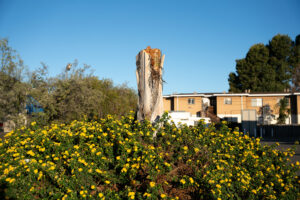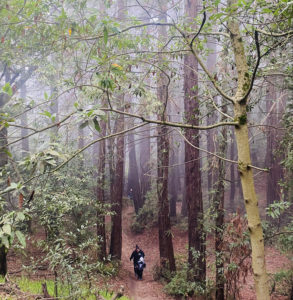This story by reporter Ally Markovich was first published in Berkeleyside, an independent, nonprofit news site.

The city of Berkeley will purchase Spenger’s parking lot and transfer the property to Sogorea Te’ Land Trust as part of a recent settlement agreement over the contested plot of land in West Berkeley.
The Berkeley City Council unanimously approved an ordinance today authorizing the purchase, making Berkeley among the first in the country to outright return land to Indigenous people. The city will purchase the property with $25.5 million from Sogorea Te’, an Indigenous-led land trust based in Oakland, and $1.5 million from the city’s general fund.
The decision appears to mark the end of a years-long legal battle over the property at 1900 Fourth St. between the city and developer Ruegg & Ellsworth. The parties in the case filed a notice of settlement in Alameda County Superior Court Friday.
For years, the legal battle pitted honoring Indigenous heritage against the need for housing during the Bay Area’s housing crisis. The outcome—returning land to Indigenous control—comes when the Indigenous land back movement is taking off.
The money for the purchase comes primarily from the Sogorea Te’ Land Trust. Bolstered by a $20 million contribution from the Kataly Foundation, a family foundation funded by Regan Pritzker of the Hyatt hotel chain and her husband Chris Olin, Sogorea Te’ appears to be the best-funded organization in the nationwide land-back movement, based on tax records reviewed by Berkeleyside.
Efforts to develop the property, a parking lot once owned by Spenger’s Fish Grotto, date back two decades. Developers faced opposition from some Ohlone, who protested the development of a sacred shellmound site. In 2018, Berkeley blocked a streamlined permit to build housing on the site. They had been embroiled in a legal battle since.
Beneath the parking lot, adjacent to an upscale commercial area in West Berkeley, some Ohlone say, is the last undeveloped part of the oldest shellmound and village site around the Bay, a ceremonial site and fishing village.
“It’s one of the most culturally significant sites for the Lisjan people and to have it protected forever, I think I’m without words,” said Corrina Gould, a co-director of Sogorea Te’ Land Trust. Gould also leads Confederated Villages of Lisjan (pronounced Le-shawn), a group of seven tribes across the Bay Area that was involved in the lawsuit alongside the city of Berkeley.
The city of Berkeley designated the site a landmark in 2000 and it was added to a list of endangered historic places by The National Trust for Historic Preservation in 2020, though questions have been raised about the exact location of the shellmound.
A plan for the property is still in the works, but Gould has expressed interest in an Ohlone memorial on the site, according to court records.

Aspirations for the site include a mixture of green space, a place for an Ohlone ceremony and possibly even a burial site for remains repatriated from UC Berkeley, according to Berkeley Councilmember Sophie Hahn.
“When there are historic harms, I believe it is incumbent on those of us in positions of authority to do everything in our power, to provide reparations and redress,” Hahn said of the decision.
Dana Ellsworth, a manager at Ruegg & Ellsworth, said she was happy to see that something would be done with property.
“The situation has gone on for two decades,” said Ellsworth. “You know, I would like to see the property developed. It looks like that’s not going to happen, but I think it’s been resolved in a fair way and I feel pretty good about it.”
Berkeley is still on the hook for $4 million for mishandling the application to build housing on the site. In February, an Alameda County Superior Court judge fined Berkeley $2.6 million for violating the Housing Accountability Act when it denied Ruegg & Ellsworth’s application for a housing project on the site. Berkeley was also ordered to pay $1.4 million for attorney fees.
Correction: A previous version of this story misspelled the name of Regan Pritzker.




